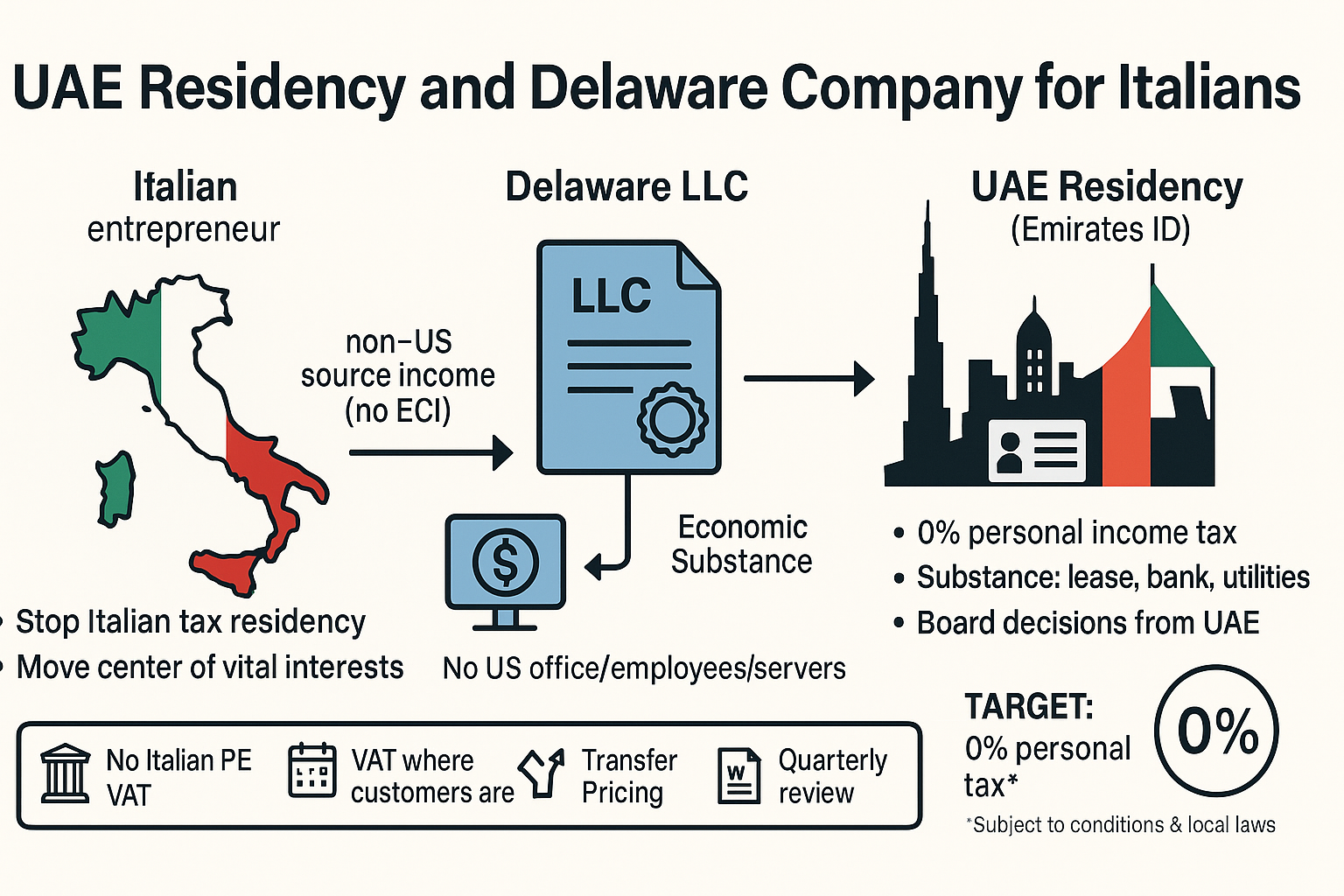European entrepreneurs are increasingly looking for international structures that allow them to lower their tax burden legally while maintaining flexibility and a high quality of life. One of the most effective strategies is the so-called three-country setup: establishing tax residency in the United Arab Emirates, running a company in the United States, and living in Bali, Indonesia. This model takes advantage of international tax treaties, territorial taxation, and regulatory loopholes that make it possible to reduce personal and corporate taxes to near zero.
1. UAE Residency: Zero Personal Income Tax
The United Arab Emirates has become the preferred destination for Europeans who want to legally escape high income taxes. By obtaining a residency visa through investment, employment, or free zone company formation, individuals can become tax residents of the UAE. The UAE does not impose personal income tax, wealth tax, or capital gains tax.
To be recognized as a UAE tax resident, individuals generally need to spend at least 183 days per year in the country or meet alternative criteria such as maintaining a permanent residence and spending at least 90 days per year. With a Tax Residency Certificate (TRC), they can prove their status internationally, avoiding taxation in their former home country.
2. USA Company: Delaware or Wyoming for Global Business
While the UAE is optimal for personal tax residency, many entrepreneurs prefer to register their company in the United States, usually in Delaware or Wyoming. These jurisdictions offer flexible legal structures like the Limited Liability Company (LLC). An LLC is considered a pass-through entity for U.S. tax purposes if it has no U.S. owners and no U.S. trade or business.
This means that if a European entrepreneur resides in the UAE and forms a Delaware or Wyoming LLC, the company itself does not pay U.S. corporate tax. The profits “flow through” to the owner, who, as a UAE resident, pays zero personal income tax. However, it is critical that the company does not create a U.S. Permanent Establishment (PE). That requires avoiding U.S. offices, employees, or clients that could link the business to U.S. taxation.
Additionally, U.S. companies enjoy global trust, access to Stripe, PayPal, and other financial tools that are sometimes limited for businesses based solely in offshore jurisdictions. This makes the structure not only tax-efficient but also operationally superior.
3. Living in Bali: Lifestyle and Territorial Taxation
Many entrepreneurs who secure UAE residency and operate through a U.S. LLC choose to live in Bali. Indonesia applies a territorial taxation principle for foreigners who hold a temporary stay visa (KITAS) or visit on long-term arrangements. This means that foreign-sourced income is not taxed if it is not remitted to Indonesia under certain conditions.
If the entrepreneur keeps business profits abroad in their U.S. or UAE bank account, and only transfers what is necessary for living expenses, their foreign income remains outside the Indonesian tax net. Combined with Bali’s low cost of living, affordable luxury, and thriving digital nomad community, this creates a highly attractive environment for Europeans seeking both lifestyle and tax efficiency.
Legal Considerations
The success of this three-country setup depends on careful compliance with international tax rules:
- Exit Tax in Europe: When leaving Europe, individuals must ensure they formally cut tax residency ties with their home country. Some European countries apply exit taxes on unrealized capital gains.
- UAE Residency Certificate: Holding a TRC is essential to avoid double taxation claims from European tax authorities.
- U.S. Compliance: Even if the LLC is tax-transparent, annual filings like Form 5472 (for foreign-owned disregarded entities) are mandatory.
- Indonesian Rules: Bali’s tax framework is evolving, and foreigners should seek local legal guidance to confirm whether their income qualifies as foreign-sourced and remains exempt.
Conclusion
By combining UAE residency, a U.S. company, and living in Bali, European entrepreneurs can legally achieve close to zero taxation while enjoying global access to financial services and a desirable lifestyle. This three-country setup leverages the strengths of each jurisdiction: the UAE’s zero personal tax, the U.S. company’s credibility and payment processing access, and Bali’s territorial tax approach with low living costs.
For Europeans tired of high taxes and regulatory burdens, this strategy represents one of the most effective ways to optimize both wealth and freedom in a globalized economy.
Book a Consultation here








